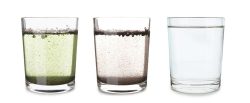How Often Should I Test My Well Water?
 How Often Should I Test My Well Water?
How Often Should I Test My Well Water?
There are many contaminants in our drinking water that can cause health problems or make us sick. The good news is that testing can help you identify and fix water problems before they become serious. It is recommended that homeowners test their well water at least once a year for both nitrates and bacteria. Having a water test done twice a year may be recommended depending on your risk of certain contaminants.
Nitrates
Nitrates are a naturally-occurring compound found in water that can have serious effects on people and livestock. Drinking water with nitrate concentrations below 10 milligrams per liter of water (mg/L) is considered safe, but high levels of nitrate can lead to illness in humans and animals. When nitrates are in the blood, they interfere with how oxygen is carried throughout the body. They can also cause methemoglobinemia, or “blue baby syndrome,” in infants who consume too much nitrate-nitrogen (NO3-N) [3,4]. With that said, nitrates in drinking water are a serious concern for all well owners. Regular testing can help ensure that your well water is safe for you and your family!
Bacteria
Most bacteria are harmless to humans, but some harmful strains can cause an upset stomach, fever, vomiting or diarrhea. In addition, some bacteria can be airborne (if you inhale them) and pose a health risk. Coliform bacteria are a group of bacteria that may be present in well water. These bacteria come from human or animal waste, and some can be more harmful than others. Fecal coliform bacteria are a subset of total coliforms, which occur in the digestive systems of warm-blooded animals and humans. This type of bacteria is often used as a first indicator of potential sewage or other animal or human waste contamination in well water. These bacteria can form a slimy coating up to 1/2-inch thick inside pipes and pumps that can increase friction losses, pumping costs and may plug the well screen or perforated well casing. These bacteria aren’t a serious problem, but it is a good idea to have your well tested for them.
Volatile Organic Compounds
VOCs, also known as volatile organic compounds, are common pollutants found in American wells. They vaporize and are especially harmful to children who breathe them. Chemicals that contaminate your well water can have many different effects on your health. Some of them can lead to cancer or other serious health conditions. Some of these harmful chemicals can also impair your immune system, which could make you more susceptible to illnesses. Other chemicals can damage your brain, kidneys and nervous system.
Chemicals
If your well water smells bad, it may be contaminated with chemicals from nearby sources. These can include chemicals from fertilizers, pesticides, fuel tanks and sewage. If you live in a high-risk area for chemicals, you should reach out to your local water system specialist to test your well water for contaminants more often than usual. And if you find these chemicals in your well water, it is essential to treat them quickly so that they do not contaminate the rest of your drinking water!
Categorised in: Water Testing
